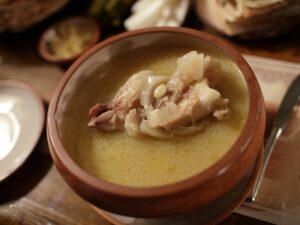

‘A Brief History of Khash, Armenia’s Love-It-or-Hate-It Hangover Cure’ a story by Benjamin Kemper, and ‘Khash’, a recipe by Samvel Hovhannisyan originally appeared in Smithsonianmag.com about two years ago.
An abbreviated version of Mr. Kemper’s article, and, Mr. Hovhannisyan’s full recipe recently appeared in the online newspaper, The Armenian Mirror Spectator’s – Recipe Corner – thanks to Christine Vartanian-Datian. She, in turn, asked if I would share these on The Armenian Kitchen.
Enjoy the full article, and, if you’re daring enough, try Mr. Hovhannisyan’s khash recipe (see below) the next time you feel a hang-over coming on!
(Perhaps after Super Bowl Sunday??)
*****
Armenian Khash (or pacha) is a traditional winter dish, and one of the tastiest Armenian national dishes. This distinctive soup has an interesting tradition of preparation, and also a unique way of eating․
“A recipe for the Armenian soup called khash, at its most basic, goes something like this: Simmer cows’ hooves overnight. Serve.”
“Gelatinous beef trotters—flavored tableside with sinus-clearing add-ins like lemon, salt, vinegar and raw garlic—may sound like the last thing you’d reach for when nursing a hangover, but Armenians swear by khash’s panacean powers, particularly in the winter, when it’s customarily eaten. Across the small Caucasus nation, friends gather for morning-after khash feasts complete with ritualistic toasts and—as Anthony Bourdain discovered while shooting a Parts Unknown episode set to air in March 2018—punishing hair-of-the-dog vodka shots.”
“Even the soup’s preparation is a production. The hooves must be plucked meticulously of any stray hairs and soaked in water for a day to remove impurities and funky odors. Then comes the cooking, an eight-hour simmer requiring hourly check-ins, lest the pot dry out. Khash-fueled breakfasts start around 9 a.m., which means cooks often literally lose sleep over the dish. “It’s a sacrifice,” said Samvel Hovhannisyan. “That’s why the toast to the cook is so important.” Hovhannisyan is the owner of Bureaucrat Café and Bookstore in Yerevan.
“For the broth to remain white and nearly transparent, the mark of a well-made khash, Armenian cooks don’t add salt to the pot during cooking: It’s up to the end user how much salt and other traditional flavorings to mix into the finished soup. Armenians are known to add up to eight cloves’ worth of garlic to each portion. Two types of lavash, or flatbread, always grace the table: dry, for crumbling into the broth, and fresh, for draping over the bowl to seal in the heat. Purists, like Hovhannisyan, insist that fresh lavash — torn and folded for easy scooping — is the only acceptable utensil for eating khash, and that vodka, never wine or beer, is its only worthy sidekick.”
“Though khash is an ancient dish, mentioned in medieval Armenian texts as early as the 12th century, the ceremonial fanfare surrounding it appears to be a relatively recent phenomenon. ‘We haven’t found evidence that today’s khash rituals—the vodka drinking, the three toasts, the specific serving elements—were widespread or well-established before the Soviets arrived,’ said Ruzanna Tsaturyan, a researcher for Armenia’s National Academy of Sciences at the Institute of Archaeology and Ethnography, adding that the few historical references that do exist characterize khash as wedding food.”
“That khash culture stems from ancient wedding traditions is one of many theories—and folktales. According to Hovhannisyan, some locals recount that a king popularized the dish after tasting it on a junket through the countryside, while others contend that the poor created khash out of necessity as the better cuts of meat were reserved for the rich.”
The name khash originates from the Armenian verb khashél, which means to boil. Besides, the Armenian root ‘khashn’, well testified in early medieval records means a herd of sheep or goats. The dish, initially called khashoy, is mentioned by a number of medieval Armenian authors, e.g. Grigor Magistros (11th century), Mkhitar Heratsi (12th century), and Yesayi Nchetsi (13th century).
Sts. Vartanantz Day is a moveable celebration on the Armenian Church calendar. This year it…
Just in time for soup season, Christine Datian offers The Armenian Kitchen her recipe for…
I don’t know about you, but in our family, we’re all about tradition when…
It’s that time of year again! St. Sarkis Day, the moveable feast day on the…
Way back in 2010 Ara Kassabian shared his family’s recipe for Nevik with The Armenian…
With Thanksgiving Day just hours away, I thought I’d share a few of our favorite,…
This website uses cookies. find out more.